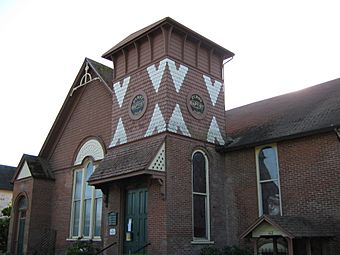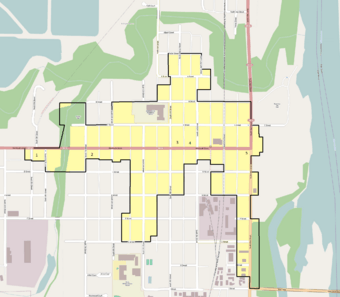Independence Historic District (Independence, Oregon) facts for kids
Quick facts for kids |
|
|
Independence Historic District
|
|

The Independence Heritage Museum (former First Baptist Church) in 2008.
|
|

District boundaries.
|
|
| Location | Roughly bounded by Butler, Main, G, and Ninth streets, Independence, Oregon |
|---|---|
| Area | 98.7 acres (39.9 ha) |
| Architect | Multiple |
| Architectural style | Queen Anne, Gothic Revival, Victorian, Italianate, Craftsman |
| NRHP reference No. | 89000048 |
| Added to NRHP | March 1, 1989 |
The Independence Historic District is a special area in Independence, Oregon. It's like a time capsule that shows what a busy town looked like in the 1880s! This district was added to the National Register of Historic Places in 1989. It covers about 30 city blocks and protects around 250 old homes and businesses.
Contents
A Look Back: Independence's Story
Independence was once a very busy town. It was a key shipping point for farm products and lumber. Goods traveled by both trains and boats on the Willamette River.
The "Hop Capital" Era
From the 1890s to the 1940s, Independence was famous for growing hops. Hops are plants used to make beer. The city even called itself the "Hop Capital of the World"!
Why the Town is Preserved Today
After the 1950s, the demand for hops went down. This meant the city's good times started to slow. But this also helped preserve the town! In the 1960s, big highways were built that went around Independence. This meant there wasn't a need to tear down old buildings to make way for new, modern ones.
Today, the historic district is becoming popular again. People are working to make it a fun place for tourists to visit.
Main Street: A Historic Walk
Main Street runs right along the Willamette River. It's a great example of a main street from the late 1800s and early 1900s. Many buildings here were built with brick between 1880 and 1900.
Victorian Architecture on Display
You can see two commercial buildings on Main Street that have tall, fancy towers. These towers are great examples of Victorian architecture. This style was popular during the time of Queen Victoria.
Important Buildings in the District
The Independence Historic District includes five buildings that are so important, they are listed separately on the National Register of Historic Places. These buildings help tell the story of the town's past.
- Dr. John E. and Mary D. Davidson House (built around 1878)
- Independence National Bank (built in 1891), designed by architect Walter D. Pugh
- Kersey C. Eldridge House (built in 1914)
- J. A. Wheeler House (built around 1880)
- Saint Patrick's Roman Catholic Church (built around 1874)
 | Georgia Louise Harris Brown |
 | Julian Abele |
 | Norma Merrick Sklarek |
 | William Sidney Pittman |

